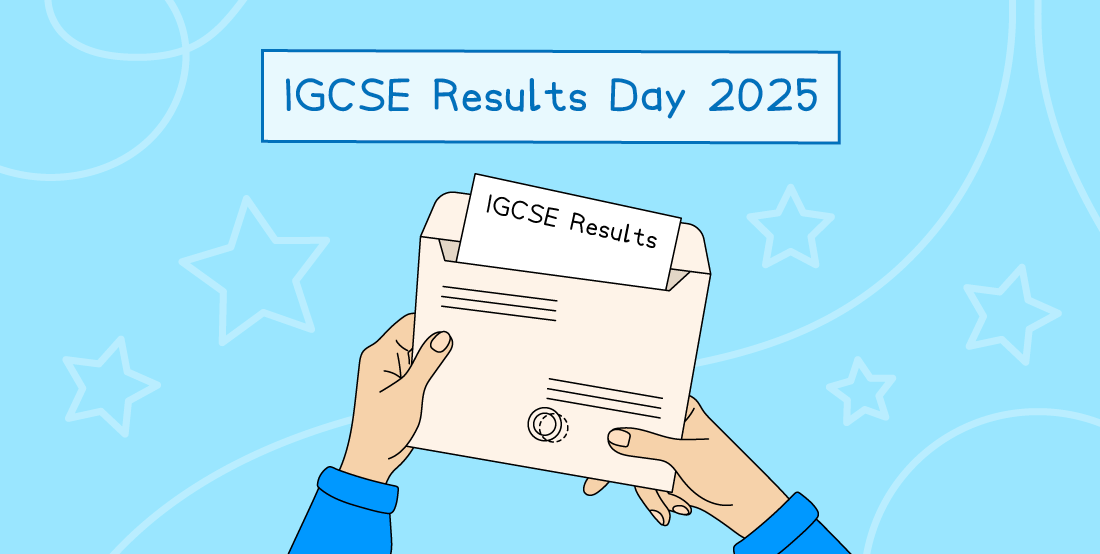IGCSE Results Day 2025: Key Dates & What To Do If Things Don’t Go To Plan
Written by: Holly Barrow
Reviewed by: Liam Taft
Last updated

Contents
- 1. When do IGCSE results come out in 2025?
- 2. How to get your IGCSE results
- 3. How to prepare for IGCSE results day
- 4. What grades do I need to pass my IGCSEs?
- 5. How to read IGCSE results
- 6. IGCSE Results Trends
- 7. ‘Bad’ IGCSE grades: What should I do if I’m disappointed with my results?
- 8. Can I resit IGCSEs?
- 9. How to appeal your IGCSE results
- 10. What support is available?
- 11. Frequently Asked Questions
- 12. Improve Your Grades with Save My Exams
IGCSE results day 2025 marks a crucial moment for students around the world.
If you’re feeling anxious about getting your results, this article will guide you through everything you need to know. You’ll find out when you can get your IGCSE results, how to prepare for results day, and what to do if you don’t get the results you were hoping for.
When do IGCSE results come out in 2025?
IGCSE results day changes depending on the exam board. If your exam board is Cambridge International Education (CIE), your IGCSE results day will be on Tuesday 19th August 2025.
If your exam board is Pearson (Edexcel) or Oxford International AQA (Oxford AQA), your IGCSE results day will be on Thursday 21st August 2025.
What time do IGCSE results come out?
Many IGCSE students can get their results online from around 9am local time. However, if your school requires you to collect your results in person, you should check what time it opens.
Some international schools may have different collection times, so check with your school in advance.
How to get your IGCSE results
You may be able to get your IGCSE results online, or may have to collect them in person. This depends on how your school or exam centre handles results.
If your school requires you to collect your results, but you’re unable to go on the day, don’t worry. You can usually have your results emailed or posted to you.
Many international schools allow students to access results online through their student portals.
If you’re unsure how to collect your IGCSE results, contact your school to confirm their process.
Do you have to open IGCSE results at school?
It isn’t usually a requirement for IGCSE students to open their results at school, so you can open them wherever you feel most comfortable. Some students prefer to be surrounded by friends, family and teachers who can be there to offer support. Others may want a moment alone to process their grades.
If you think your results may be lower than expected, opening them at school can be helpful, as you can get immediate advice from teachers on what to do next. Remember, there are plenty of options if your results aren’t what you were hoping for.
How to prepare for IGCSE results day
How to manage anxiety about IGCSE results day
It’s natural to feel nervous before receiving your results, but remember that worrying won’t change the outcome. Try to focus on things you can control—such as preparing for different possible scenarios.
Spending time with friends and family, engaging in hobbies or planning an enjoyable activity can help take your mind off any nerves. Remind yourself that no matter what happens, there are always options available to you.
For many students, the whole IGCSE process is nerve-racking.
To help reduce or prevent any anxiety you may be feeling, download our free exam anxiety relief kit.
What to take on IGCSE results day
If you’ll be collecting your IGCSE results in person, here are some essentials that you’ll want to take with you:
Photo ID – Some schools may require ID to collect your results.
A fully charged phone – Whether for celebrating, sharing the news or calling schools for advice.
Pen and paper – In case you need to take notes during discussions with teachers or advisors.
If you’re planning on getting your results online, make sure you have your school or exam centre’s online portal login details.
If you’ve applied for sixth form, college or university, it’s also worth reminding yourself of their entry requirements in advance. This way, you’ll know whether you need to explore alternative options on the day.
What grades do I need to pass my IGCSEs?
IGCSEs are graded differently depending on the exam board.
CIE IGCSEs are graded A*–G around the world. Edexcel and Oxford AQA IGCSEs are graded using the 9-1 numerical system. A ‘pass’ at IGCSE is usually a grade C or 4.
Here’s how the numerical system compares to the letter grade system:
Numerical System | Letter Grading System |
9 | A* |
8 | A*/high A |
7 | Low A |
6 | High B |
5 | Low B/high C |
4 | Low C (pass) |
3 | D/high E |
2 | Low E/high F |
1 | Low F/G |
0 | Ungraded |
How to read IGCSE results
So you’ve made it to your school or logged in to your student portal, and you’re desperate to see your results. But how do you actually make sense of them?
When you receive your results, the first thing you’ll see is usually your personal details. This includes your name, date of birth, candidate number and centre name.
Below this, you’ll see each subject listed, along with the course code (you don’t need to pay attention to this) and your final grade. Depending on the country and exam board, you may also see a ‘percentage uniform mark’.
Your grade will range from 9 (highest) to 1 (lowest) if your exam board is Edexcel or Oxford AQA. If your exam board is CIE, your grade will range from A* (highest) to G (lowest).
What is the percentage uniform mark?
Some students may see a ‘percentage uniform mark’ listed next to their overall IGCSE grade for each subject. This depends on the exam board and which country you’re in. The percentage uniform mark is not the total mark achieved for the course. It’s a scale that shows whether your performance is near the top, middle or bottom of the grade.
For example, a student who gets the minimum mark necessary for a grade A will get a percentage uniform mark of 80. A student who gets a high A will get a percentage uniform mark ranging from around 86-89.
If you want to find out more about the IGCSE grading system and grade boundaries, check out our guide.
IGCSE Results Trends
If you’re keen to learn about previous IGCSE results, we’ve analysed CIE’s results data to highlight some interesting trends.
Comparing 2019 data to 2024 data, we found that Mandarin Chinese (Foreign Language) is consistently a top-performing subject, with an A* rate above 70% every year. On the other end of the scale, Art and Design consistently has one of the lowest A rates.
In 2024, student entries for Environmental Management increased by 36%, Global Perspectives by 15%, Computer Science by 14%, Accounting by 13% and Business Studies by 10%.

But the overall most popular IGCSE subjects continue to be:
Maths
Physics
First Language English
Chemistry
Biology
Some STEM subjects continue to see a decline in the percentage of students achieving A* grades. The percentage of IGCSE students achieving an A* in Physics in 2024 dropped by 13.9 percentage points compared to 2019.
A similar decline can be seen with IGCSE Biology, where just 13.4% of students achieved an A* in 2024 vs 23.1% of students achieving an A* in 2019.
‘Bad’ IGCSE grades: What should I do if I’m disappointed with my results?
If your IGCSE results aren’t what you hoped for, don’t worry—this isn’t the end of your academic journey. There are still plenty of options available, and with the right approach, you can move forward successfully.
What if I didn’t get the grades I need for A Levels or IB?
If your IGCSE results aren’t high enough for your chosen A Level or IB courses, here’s what you can do next:
1. Speak to Your School or College
Your first step should be to contact the school or college where you planned to study. Some may still accept you on your chosen course, especially if you only missed the required grades by a small margin. They may also offer you an alternative set of subjects.
2. Consider Different Schools or Colleges
Entry requirements vary between institutions. If your first choice school or college won’t accept you, another college or sixth form might have more flexibility.
3. Resit Your IGCSEs
If your grades are significantly lower than expected, you may want to resit certain subjects. Many schools and exam centres offer November resits for core subjects like Maths and English. Other subjects may need to be retaken in May/June the following year.
4. Explore Alternative Qualifications
If A Levels or IB are no longer an option, there are other pathways to consider:
BTECs – Career-focused courses that are equivalent to A Levels in many fields
T Levels – A mix of classroom study and industry placement
Foundation Courses – Some universities offer pre-university foundation programmes that help students bridge the gap if they don’t meet A Level/IB entry requirements
Apprenticeships – If you prefer a hands-on approach, apprenticeships allow you to earn while you learn in a specific career field
Can I resit IGCSEs?
Yes! If you want to improve your grades, you can resit IGCSE exams. It’s not compulsory to resit your IGCSEs, but if you fail to achieve a pass (grade 4 or C) in core subjects like English and Maths, it’s highly advisable.
November resits – Available for core subjects like English and Maths.
Summer resits – Available for all subjects.
Private exam centres – If your school doesn’t offer resits, you may be able to take them at a private centre.
There are also a number of online learning platforms that offer courses to help you prepare for IGCSE resits. You’ll have to take the exams in person at an accredited exam centre, but these online providers can help you to prepare.
Check out Save My Exams’ IGCSE revision resources to boost your chances of improving your grades. We also offer our top tips and advice on resitting your GCSEs here, which can also be applied to IGCSEs.
How to appeal your IGCSE results
If you believe your IGCSE results are incorrect, you can request a review of marking. However, be aware that grades can go up, down or remain the same following a review, and that this will be your final grade regardless.
How does the IGCSE appeal process work?
Request a Copy of Your Marked Paper – If you want to review your exam script before appealing, you can ask for a copy from your exam board.
Apply for a Review of Marking – Your paper will be reevaluated by another examiner.
Pay a Fee – Appeals usually come with a fee, which varies depending on the exam board.
Your school can guide you through this process, so speak to a teacher or exam officer if you’re unsure.
It’s important to note that there are deadlines for requesting a review of marking and requesting a copy of your marked paper. These dates vary depending on the exam board, but the deadlines typically fall around mid-September for the summer exam series.
What support is available?
The appeals process for IGCSEs can be daunting for students. Remember, there’s a whole host of people you can go to for support and guidance.
Talk to Your Teachers – Your teachers can help you decide whether an appeal is worth pursuing and talk you through the appeal process. They can often provide an unbiased opinion to help establish whether it’s worth appealing.
Contact Your Exams Officer – They handle appeals and can provide guidance.
Seek Advice from Exam Boards – CIE, Edexcel and Oxford AQA have clear appeal processes you can follow.
Emotional Support – If you're feeling overwhelmed, talking to a school counsellor or support service can help.
Frequently Asked Questions
Are IGCSE results important for university?
Many students and parents wonder how much weight IGCSE results carry when it comes to university admissions. While IGCSEs are not the final qualification for university entry, they do play a big role.
Top universities, especially in the UK and US, will consider your A Level or IB results as well as your IGCSE results. High IGCSE grades can give an applicant a competitive edge, especially when applying to prestigious universities.
Many universities require at least a grade 4 (or C) in core subjects such as Maths and English. Some competitive courses, like Medicine or Engineering, may require higher grades in Science and Maths at IGCSE level.
If you know what and where you want to study, you can check IGCSE requirements on the university website.
What happens if I’m on holiday on IGCSE results day?
With IGCSEs, most schools allow students to get their results online. It shouldn’t impact you if you happen to be away – and you should enjoy your well-earned break wherever you may be.
That being said, you should still let your school know in advance that you’ll be away for results day. Some schools may still require students to collect results in person.
If that’s the case, you may be able to nominate a friend, family member or guardian to collect your results for you. This usually requires you to sign a letter in advance giving your permission, and the person will have to take photo ID on the day.
You can also arrange to have your results posted or emailed to you, so there are plenty of options available.
If a last minute emergency arises, and you can’t make it on the day, call your school to see what they can do. They’ll usually be able to post out your results or email them to you.
If you've applied to go to sixth form or college, it’s important to note that they may have an enrolment day on the same day as IGCSE results day. If you’re away for this, you’ll need to give them a call and see if they can rearrange another date for you.
How do I get IGCSE certificates?
Your IGCSE certificates are separate to the statement of results you’ll receive on results day.
Exam boards will usually send your IGCSE certificates to your school after their deadline for enquiries about results has passed.
For the summer exam series, this falls around October time.
Your school will usually notify you when your IGCSE certificates are ready to be collected, and it’s important that you collect these when you can.
These certificates verify your IGCSE results to future employers and universities, but if you happen to lose them, you can usually order a replacement 'certified statement of results' from the exam board at a cost.
What happens if you do worse in an IGCSE resit?
If you get a lower grade in your IGCSE resit, don’t panic–your higher result will still be valid.
If you resit an exam, you will simply have two results and certificates for that qualification. Resitting doesn’t invalidate the previous result, so the better result can be used.
However, appeals are different. If you appeal your IGCSE result, your remark will be your final grade regardless of if it goes up, goes down or stays the same.
If you needed to improve your grades for college or university, it’s a good idea to re-explore your options. There are many alternatives to A Levels or the IB programme; check out our guide to A Level equivalents to find out more.
Improve Your Grades with Save My Exams
Save My Exams offers high-quality, affordable revision resources and supports over 1.5 million students each month in preparing for their exams. Get instant access to past papers, exam-style questions, concise revision notes and more.
All of our resources are tailored to each exam board, so you can focus solely on the content needed for your specific course. With expert feedback on practice questions and engaging video content, Save My Exams provides everything you need to excel.
Explore our IGCSE Revision Resources.
References
85% of UK Students Experience Exam Anxiety
Test Anxiety Amongst University Students: A Cross-Sectional Study
Sign up for articles sent directly to your inbox
Receive news, articles and guides directly from our team of experts.

Share this article


 written revision resources that improve your
written revision resources that improve your